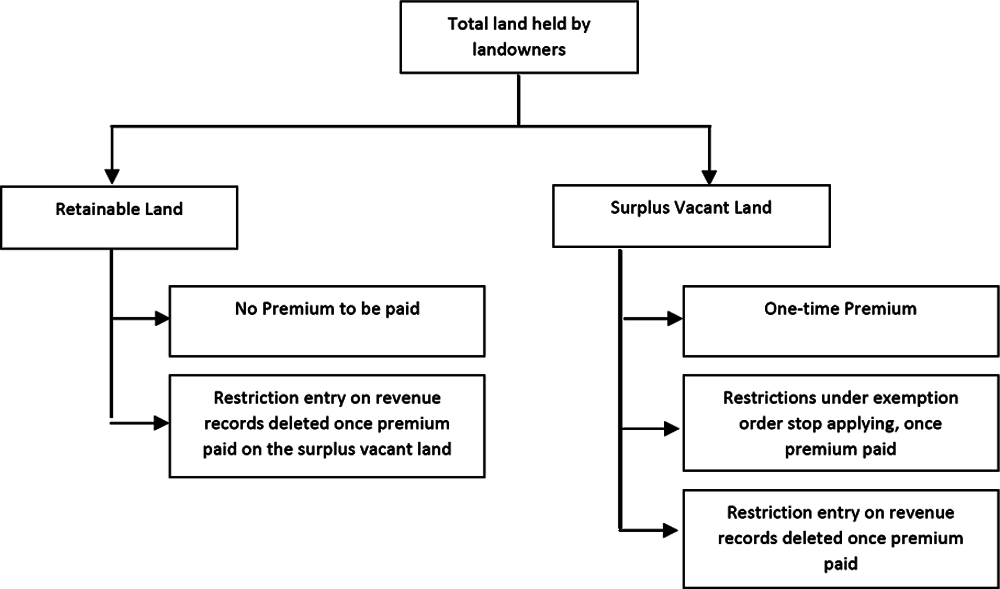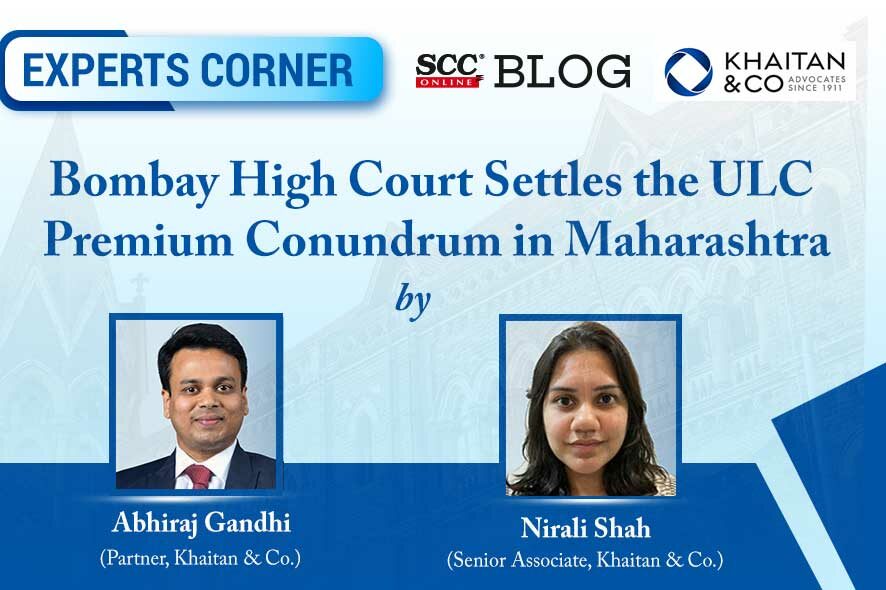Despite the Urban Land (Ceiling and Regulation) Act, 1976 (ULC Act) being repealed by the Urban Land (Ceiling and Regulation) Repeal Act, 1999 (repeal Act) for over a decade, the saving of the exemption orders passed under Section 20(1) of the ULC Act has remained a point of concern for landowners and developers of lands situated in urban areas of Maharashtra who hold large undeveloped land parcels.
Survival of Section 20 exemption orders post repeal Act
On 3-9-2014, a Full Bench of Bombay High Court1 (HC) considered the effect of the repeal Act and held by majority that the exemption granted under Section 20 of the ULC Act survived even after the enforcement of the repeal Act. This decision of the HC was challenged by the Maharashtra Chamber of Housing Industry (MCHI) before the Supreme Court (SC) under a special leave petition2 in which the SC by its order dated 10-11-2014 issued directions that “no coercive action” must be taken against the respective landowner/developer.
In the meantime, the Government of Maharashtra appointed a committee under the chairmanship of former Justice B.N. Srikrishna and this Committee (Committee) recommended that the issue of exemption orders under Section 20 of the ULC Act should be closed by accepting a premium amount. The recommendations made by Committee were accepted by the SC in the pending special leave petition.
Introduction of one-time premium payment
Pursuant to the Committee’s report, the State Government issued a Government Resolution dated 1-8-2019 (GR of 2019) which effectively offered a solution to free up lands for which exemption orders under Section 20 of the ULC Act were issued under the ULC Act by accepting a one-time premium amount from the landowners/developers. GR of 2019 was followed by GR of 2021 (dated 23-6-2021) which inter alia provided for the basis for computation of the one-time premium amount. For this article, GR of 2019 and GR of 2021 will be collectively referred as GRs.
As per the GRs, a certain percentage of the prevailing annual ready reckoner rates, was sought to be levied as one-time premium to be calculated on the “एकूणक्षेत्र / entire land” (as per the maximum area mentioned under Section 20 exemption order without any deductions) for various schemes e.g.: 15% of the annual ready reckoner rate in cases where exemption was granted for industrial purposes, etc.
Deletion of ULC remarks from revenue records
The GR of 2019 further stated that upon payment of one-time premium amount in respect of the entire area exempted under Section 20 exemption order, the remark of ULC would be deleted from the revenue records for the properties concerned.
Clarification sought by stakeholders concerned
In pursuance of the GRs, several landowners and developers submitted applications to the State Government to free up the exempted lands and thereafter permissions were being granted by the State Government allowing transfer and development of the exempted lands subject however to payment of one-time premium computed on the entire area for the lands under application. On paying the one-time premium, the exempted lands, were freed up and the remark of restriction on development or transfer under provisions of ULC Act was deleted from the revenue records in respect of such lands.
References were made by the stakeholders concerned to the State Government for seeking clarifications inter alia as regards whether the area to be considered for the purposes of calculating the one-time premium would be the entire area covered under the exemption order or only the area of surplus vacant land. In response, the Urban Development Department of Government of Maharashtra, in its letter dated 15-7-2021 addressed to the District Collector and Competent Authority (ULC), clarified that since the one-time premium amount was to be used for creating houses for lower income group and with a view to generate maximum revenues for this larger good, the area to be considered for charging one-time premium would be the total land area under the exemption order without any deductions.
The HC interprets the GRs
The HC Division Bench of Justices Gautam Shirish Patel and Neela Gokhale have in their order dated 30-3-2023 passed in a writ petition3 filed by Salim Alimohomed Porbanderwalla (petitioner) against the State of Maharashtra and the Additional Collector and Competent Authority (ULC), passed one of the first orders interpreting the wordings “एकूणक्षेत्र / entire land” as used in the GR of 2019.
In this matter, despite making payment of the one-time premium on the entire surplus vacant land, the State Government was unwilling to delete the remark of restriction on development or transfer under provisions of ULC Act from the record-of-rights and other records regarding the entire property of the petitioner until the premium was paid in respect of the balance area of the exempted land.
The petitioner contended that the ULC remark appearing on revenue records should be removed once the premium calculated as per GRs on surplus vacant land is paid to the State Government, as the expression “entire land” meant the whole of the surplus vacant land and not the entire exempted land.
From the submissions made by the State, it was understood that the reason for levying one-time premium on the entire exempted land was twofold, firstly, because according to the State Government, it was the failure of the petitioner to implement Section 20 scheme within prescribed timelines that resulted in this situation and secondly, the GRs spoke of the premium to be paid on the “entire land”, which according to the State Government is a term used in the context of the entire land exempted under the exemption order and not just the area of surplus vacant land.
The HC, however, clarified that the wordings “एकूणक्षेत्र /entire land” as used in the GR of 2019 did not mean the entire exempted land (inclusive of the land allowed to be retained by the landholder) but it only meant entire surplus vacant land and further stated that the State could charge a premium only on the surplus vacant land. The HC acknowledged that the GR of 2019 used the words “entire land” but clarified that these words were to be read in a context to mean only the surplus vacant land and could not be unreasonably expanded to include “exempted” within ceiling lands. The HC further explained that retaining the entries in the revenue records for within ceiling retainable land, despite payment of full premium for the surplus vacant land, would be unlawful.
Arguments relating to constitutionality of GRs
It was argued on behalf of the petitioner that no premium whatsoever, could be charged on the part of the land that was retainable i.e. exempted land and which was in the ownership of the petitioner, for it may not only render the GRs entirely unconstitutional being afoul of Article 300-A (right to property) of the Constitution of India but would also mean an indirect reintroduction of Section 27(1) of the ULC Act in a different form which section has already been held to be unconstitutional4.
The HC also observed that quantum of amounts involved, even if sizeable, did not matter when questions of validity and constitutionality were dealt with and on no account should the Government venture into an area that would have the result of rendering the GR of 2019 susceptible to a full-fledged constitutional challenge.
In summary

Conclusion and comment
The HC order of 30-3-202355 provides a significant clarity on computation of premium in terms of the GRs and this could now impact the fate of several pending cases across the State. The landowners and developers will seek to benefit from this decision as it will lower the development cost for them.
The State Government should come up with a clarification to the GRs to bring out the much-needed clarity provided by the HC. However, pending such clarification from the State Government, the authorities must ensure that ULC premiums are computed in accordance with this order. Further, it would also be worthwhile to see if owners/developers make claims seeking refund of the premiums already paid by them for the land area over and above the surplus vacant land to get their lands freed from ULC.
† Partner, Khaitan & Co
†† Senior Associate, Khaitan & Co
1. Maharashtra Chamber of Housing Industry v. State of Maharashtra, 2014 SCC OnLine Bom 1083
2. Maharashtra Chamber of Housing Industry v. State of Maharashtra, Special Leave Petition (C) No. 29006 of 2014.
3. Salim Alimohomed Porbanderwalla v. State of Maharashtra, 2023 SCC OnLine Bom 731.
4. Vide a decision of five-Judge Bench of Supreme Court of India in Bhim Singhji v. Union of India, (1981) 1 SCC 166, the constitutional validity of ULC Act was upheld except Section 27(1) because it provided for a restriction on transfer of any urban or urbanisable land with a building or a portion of a building and which was within the ceiling area.
5. Salim Alimohomed Porbanderwalla, 2023 SCC OnLine Bom 731.








Reply to my recent comment